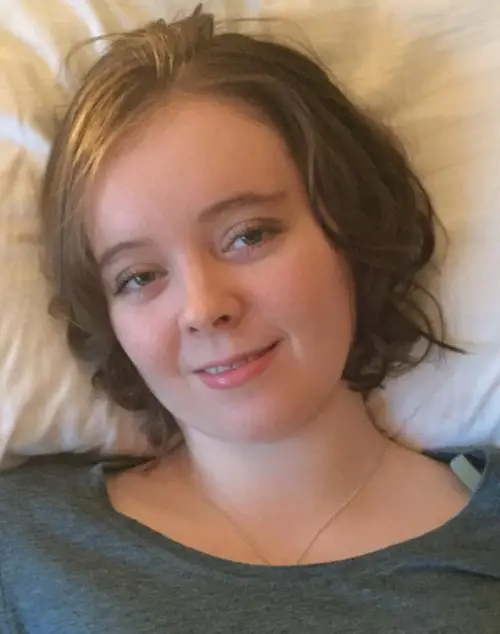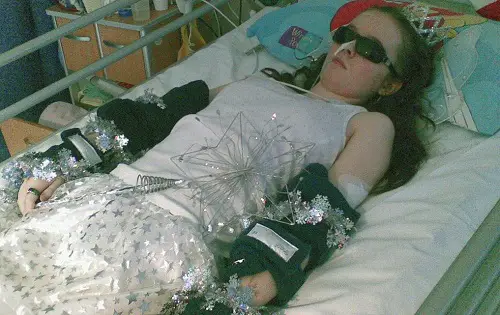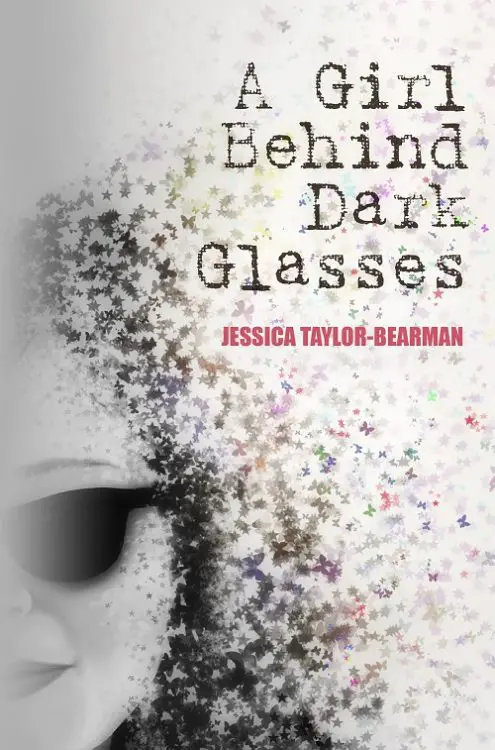
The Girl Behind Dark Glasses: a memoir of living bedridden with ME
Writing can be a great outlet, especially when it comes to dealing with a life-changing disability. Jessica, who has ME and Osteoporosis, has used writing as a coping mechanism ever since she became ill. Here, she tells us about her biographical book, The Girl Behind Dark Glasses, and how she hopes it’ll make a difference for people with her disability.
My name is Jessica Taylor-Bearman and I am 27 years old. 12 of those years have been spent mostly bedbound with severe Myalgic Encephalomyelitis (ME) and Osteoporosis.
Before I became unwell, I was an active teenager, living life to the full. I enjoyed sports and academia, whilst having an exciting social life – it was everything a 15-year-old would have expected from life. I went to a grammar school and was predicted to achieve high grades. I had already completed two GCSE two years early and was doing an AS level too.
Becoming disabled
But, at the age of 15, I caught a flu virus. It was from there that my problems began.
I could never fully get rid of the feeling of being unwell. I pushed to continue with my old lifestyle, but became more and more poorly. Eventually, after pushing myself for too long, I became wheelchair bound, homebound, and then hospitalised.
There was nothing doctors could suggest to help me feel any better. I’d heaved my body as far as I could, desperately trying to regain my old life. The medical attitude was to ‘wait and see’. Eventually, after a long wait, I was diagnosed with ME.

Myalgic Encephalomyelitis
ME, which is also referred to as Chronic Fatigue Syndrome, is a neuro-immune disease that causes a range of complex symptoms, from extreme exhaustion to excruciating pain throughout your body. There are more than one hundred symptoms, most of which I have had.
One effect that’s been particularly difficult to live with is being hypersensitive to light, which means I wear dark glasses. I am also very sensitive to sound, so wear industrial-strength earplugs. I can only tolerate a whisper – everything else was just too painful.
There is a distinct lack of understanding in the medical field about what can be done to help the patients with ME get better. Some people think that, to an extent, the disease is in a person’s head, and that changing their mindset will change how they feel physically. I was encouraged to undergo Graded Exercise Therapy and Cognitive Behavioural Therapy, neither of which helped, but were instead incredibly detrimental to my health.
12 years after becoming ill, there are still no alternative treatments for ME on the National Health Service. We desperately need biomedical research done to better understand this disease and its possible cures.
Using writing to deal with my disability
Writing has always provided me with an outlet. I really enjoyed English at school, and wrote creatively from an early age. I also used to enjoy writing with my gran but, at that point, it was more of a hobby. I’d always dreamed of being an author though.
When I became ill, I started to religiously document what was happening to me through my diary ‘Bug’, which I’d bought with my gran on holiday as a child. It was my way of holding onto my sanity. ‘Bug’ meant everything to me.
When I was hospitalised in 2006, I couldn’t speak, eat, or move. But I was storing information about happened that day as I knew, one day, I would write a book about this bizarre time of not being able to do anything for myself. At points, I couldn’t even think, so it was a great challenge.

I started to try and think of a sentence a day that I could code to my parents. I would use sounds to phonetically start a word, then my parents would guess what it was. I kept going for as long as I could, until I moved hospital and I had no one to code to. I then got a dictaphone, which meant I could record the noises.
Years later, I went over everything and translated what I had recorded and what had been written for me. This became the start of the book.
Writing about my life with ME
Putting the book together was a very strange experience. I had to decode everything and then write it onto an iPod Touch. That then became my piece of paper!
But I persevered. For me, it’s so important that people who have never experienced anything like this understand what it’s like to live without a voice. The book is the voice of the voiceless.
It tells my story, from being a perfectly healthy teenager enjoying life, to an incredibly unwell girl suffering from one of the severest forms of ME, spending her days living in a hospital.

Far from being completely depressing, it inspires people to keep living. There are harrowing parts, as it follows my defiance to keep going through the highs and lows of the disease, despite the obstacles I faced. But it’s also about hope and overcoming adversity.
“A Girl Behind Dark Glasses is who I am. I cannot lie to people and pretend I’m something I’m not. This is my life and people need to know about it. One day, my story could be the basis for change… One day I would be flying free from this. On that day, I would have a book in shops; my name on its cover, and I would have done my bit to help make a difference. That is what fuelled me every day that I battled against the ME Monster.”
Ultimately, it is a book that will make you question how disabled people are treated, by medical professionals and society, and hopefully change attitudes toward people living with this dibilitating disability. But it will also show you how the human spirit can survive and hold onto the belief of a future beyond endless suffering.
“The world doesn’t stop spinning to wait for people like me to get back on the ride. It carries on. I was left in space.”
By Jessica Taylor-Bearman
You can buy The Girl Behind Dark Glasses in paperback, audiobook and for your Kindle on Amazon.
More on Disability Horizons…
waves hi to Jess. I’ve been following your progress for a while. From people postingon fb and also your World of One Room page. It was so exciting to see you I think on bbc website those times, firstly when you went to Burrswood for some recuperative therapy and learned to sit up and walk a bit, and then that glorious clip of you actually WALKING a bit down the aisle for your wedding. Though to be honest it made me anxious as i could see your energy visibly slipping away. And it was so lovely to see you in Jen Brea’s Unrest film too. So I don’t know you from Adam but your way of living with this stupid illness has really helped me with mine. so thankyou! Here’s to hoping current medical research finds us all some answers and we don’t overdo it and revert to immobility before it happens!
I’m also thrilled your book is available as audiobook – I lost the ability to hold a book and concentrate on the storyline 5 years ago when I became severe (nothing as severe as yours though) and then there wasn’t anywhere to escape from the daily grind except my head, and I couldn’t even remember good memories. Like you said in Unrest, I pictured places in my head to be when I could. I still can’t read (bah) but I can now concentrate and I was wondering what to do with my next Audible credit. You have another book sold!
For people who would like to see more about Jess (all very watchable things with good story lines not just about people being unwell and having a moan and definitely not ‘oh look how inspirational this disabled/sick person is’)
– BBC footage of her wedding walk summer 2017 short clip https://www.youtube.com/watch?v=SlzR0S9vUx4
– She’s also in this Newsbeat documentary summer 2018 half hour https://www.youtube.com/watch?v=XLPCuEdqIWY
– Documentary Feature Film by Jen Brea – Unrest – can be rented/bought on all sorts of platforms. Independently funded so please don’t watch a pirate version, they need the revenue to raise awareness. https://www.unrest.film/ I was cautious of Unrest at first, given the earlier film Voices in the Shadows (which Jess isn’t in but you can rent for free on Vimeo with the code they give you) was so unrelentingly bleak. But it’s a really entertaining and informative watch – I’ve been using it to show my carers how the illness can fluctuate and it’s not just about ‘being tired’. They’ve assured me it is an interesting film in and of itself even if you have no interest in me/cfs per se. Which is reassuring! Importantly, these films and clips have helped my carers understand how and why I live the way I do and it’s all gone a lot more smoothly since!
-Finally Jen Brea’s TED Talk as her experience of me/cfs is very different but has similar themes to Jess’ https://www.youtube.com/watch?v=Fb3yp4uJhq0
For anyone with severe me/cfs who isn’t getting answers from the NHS and doesn’t know where to turn – Burrswood hospital no longer takes inpatients in the way Jess was helped by Dr Paul Worthley and his team. However, Hannah Clifton (who was severely affected and helped by Burrswood) has set up a very well and transparently governed charity called The ME Trust. They offer private telephone consultations with Dr Paul, and a variety of other professionals, or visits or a clinic. The costs are deliberately far lower than usual private medicine fees, and they have limited funds to support those who cannot afford to pay to ensure they are not excluded from help https://www.metrust.org.uk/
NB to moderators, I do hope that it’s ok for me to put the information I did, one of the major issues with me/cfs at any level is the lack of a reliable NHS pathway (in the UK but also globally) to diagnosis and there’s no cure or treatment on offer. As a result, people are diagnosed far too late, keep pushing themselves (sometimes on medical advice to do so) and end up significantly more disabled/unwell with no hope of reliable recovery as it’s a fluctuating illness by accident. And there’s a lot of snakeoil salesmen out there promising the earth that can’t deliver reliably to all their clients, if at all.